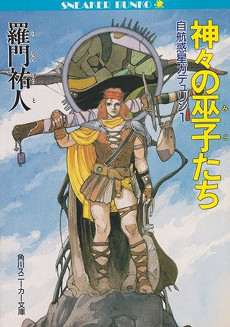Software:Gdleen
| Jikō Wakusei Gdleen | |
 Cover of the first light novel | |
| 自航惑星ガデュリン (Jikō Wakusei Gadyurin) | |
|---|---|
| Genre | Science fiction |
| Light novel | |
| Written by | Yuto Ramon |
| Illustrated by | Hitoshi Yoneda |
| Published by | Kadokawa Shoten |
| Imprint | Sneaker Bunko |
| Demographic | Male |
| Original run | September 1989 – November 1991 |
| Volumes | 7 |
| Original video animation | |
| Directed by | Takao Kato, Toyoo Ashida |
| Written by | Michiru Shimada |
| Music by | Michiaki Kato |
| Studio | Tokyo Laboratory |
| Released | March 1, 1990 |
| Runtime | 45 minutes |
| Game | |
| Developer | Jorudan |
| Publisher | SETA |
| Genre | Role-playing game |
| Platform | Super Famicom |
| Released | May 28, 1991 |
Jikō Wakusei Gdleen (自航惑星ガデュリン Jikō Wakusei Gadyurin), known simply as Gdleen, is a Japanese science fiction light novel series written by Yuto Ramon and illustrated by Hitoshi Yoneda. The first novel in the series, subtitled Kamigami no Mikotachi (神々の巫子たち, trans. The Shamans of the Gods), was published in September 1989 by Kadokawa Shoten under the Sneaker Bunko imprint. It was adapted into an original video animation and released in 1990.
A role-playing video game based on the anime was developed by Jorudan and published by SETA, for the Super Famicom in 1991.
Plot
The plot of Gdleen revolves around Ryūn who crash lands on the planet Gdleen. There he meets Fana and the two are soon entangled in a long-standing war between the Babaress and Miyorl tribes.
Media
Light novels
- Jikō Wakusei Gdleen series
| No. | Subtitle | Release date | ISBN |
|---|---|---|---|
| 1 | Kamigami no Mikotachi (神々の巫子たち, trans. Shamans of the Gods) | September 1989[1] | 978-4044112011 |
| 2 | Ryūn no Densetsu (リューンの伝説, trans. Legend of Ryūn) | November 1989[2] | 978-4044112028 |
| 3 | Gdleen Keikaku (ガデュリン計画, trans. The Gdleen Project) | January 1990[3] | 978-4044112035 |
- Gdleen (Ai Hōrō Hen (愛・放浪編)) series
| No. | Subtitle | Release date | ISBN |
|---|---|---|---|
| 1 | Atsuki Kaze no Otome (熱き風の乙女, trans. Maiden of the Passionate Wind) | October 1990[4] | 978-4044112042 |
| 2 | Kurenai no Senshi-tachi (紅の戦士たち, trans. The Crimson Warriors) | December 1990[5] | 978-4044112059 |
| 3 | Unmei no Hijiri Kyōdai (運命の聖兄妹, trans. The Fated Holy Siblings) | May 1991[6] | 978-4044112066 |
| 4 | Taiyō no Musume (太陽の娘, trans. Daughter of the Sun) | November 1991[7] | 978-4044112073 |
Anime
The OVA, called Gdleen, was directed by Takao Kato and Toyoo Ashida and based on a screenplay written by Michiru Shimada.
Video game
The video game adaptation, called Gdleen,[8][unreliable source?] was designed by Yuhei Yamaguchi, while the music was composed by Psychosonic, You Ohyama, and Toshimichi Isoe.[9][unreliable source?] It is a single-player video game, and was the first role-playing game for the Super Famicom,[citation needed] released six months after the video game console's launch in Japan.
References
- ↑ (in Japanese)ASIN 4044112010.
- ↑ (in Japanese)ASIN 4044112029.
- ↑ (in Japanese)ASIN 4044112037.
- ↑ (in Japanese)ASIN 4044112045.
- ↑ (in Japanese)ASIN 4044112053.
- ↑ (in Japanese)ASIN 4044112061.
- ↑ (in Japanese)ASIN 404411207X.
- ↑ "Error: no
|title=specified when using {{Cite web}}" (in Japanese). super-famicom.jp. http://www.super-famicom.jp/data/ka/gadhu.html. Retrieved September 15, 2012. - ↑ "GD Leen for SNES (1991)". MobyGames. http://www.mobygames.com/game/snes/gdleen. Retrieved September 15, 2012.
External links
 |
